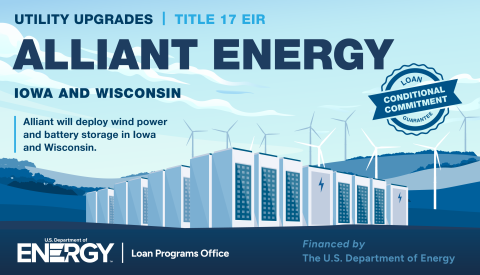Alliant will deploy wind power and battery storage in Iowa and Wisconsin.
Office of Energy Dominance Financing
January 16, 2025The U.S. Department of Energy’s Loan Programs Office (LPO) announced today two conditional commitments for loan guarantees totaling over $3 billion to Alliant Energy subsidiaries for portfolios of individual projects. If finalized, the guarantees will help finance the addition of approximately 2,000 megawatts (MW) of clean energy generation and storage in Iowa and Wisconsin within the next decade.
LPO’s financing of the projects will come at a lower interest rate than traditional capital market financing, which is expected to result in meaningful cost savings. These savings can help Alliant Energy continue to deliver affordable energy for its approximately 1 million electric customers.
Alliant Energy is a holding company of regulated, investor-owned utilities providing electricity and gas to customers in Iowa and Wisconsin. The company retired a major coal-fired facility in Iowa in 2023 and plans to cease burning coal at its coal-fired facility in Wisconsin before 2030. Alliant Energy seeks to replace that generation with cleaner power, consistent with the company’s Clean Energy Blueprint planning and Clean Energy Vision goals. Alliant aims to reduce greenhouse gas emissions from its utility operations by 50% from 2005 levels by 2030 and eliminate all coal from its generation fleet by 2040. The DOE loan guarantees would finance multiple clean energy and battery energy storage system projects.
The loan guarantees would be offered through LPO’s Energy Infrastructure Reinvestment (EIR) program, which was created by the Inflation Reduction Act of 2022. Through EIR, LPO supports projects that retool, repower, repurpose, or replace energy infrastructure that has ceased operations, or that enable operating energy infrastructure to avoid, reduce, utilize, or sequester air pollutants or greenhouse gas emissions.
The proposed projects, submitted by two of Alliant’s subsidiaries––Interstate Power and Light (IPL) and Wisconsin Power and Light (WPL)––under separate applications, were evaluated using LPO’s flexible loan facility and disbursement approach, which is tailored for regulated, investment-grade utilities. Electric utility borrowers for EIR projects must demonstrate that the financial benefits received from the DOE loan guarantee will be passed on to the customers of, or communities served by, that utility.
LPO borrowers are required to develop and ultimately implement a comprehensive Community Benefits Plan (CBP). CBPs ensure borrowers meaningfully engage with community and labor groups to create good-paying jobs and improve the well-being of the local community and workers. In addition to providing lower-cost financing, the projects supported by the loan guarantees are expected to create hundreds of construction jobs and numerous operations jobs in Wisconsin and Iowa. Alliant Energy’s workforce is represented by collective bargaining agreements with the International Brotherhood of Electrical Workers (IBEW). The company’s management team communicates with union leaders regularly to provide updates on capital planning, timelines, and action plans and to discuss upcoming facility retirements.
Alliant Energy also offers apprenticeships in electric, gas, and combination positions and works closely with educational institutions across Wisconsin and Iowa to provide job training opportunities. IPL and WPL will be pursuing both production tax credits (PTCs) and investment tax credits (ITCs) by meeting prevailing wage and apprenticeship requirements. The subsidiaries each have projects that will be in an “energy community” and qualify for the 10% additional tax credit associated with that distinction. IPL and WPL have been working closely with organized labor and workers to manage the worker transition as part of the retirement of some plants. To help with changes in the existing workforce, the subsidiaries have reskilling programs in place to shift these employees into other apprenticeships across the company or assist them with finding jobs in other industries.
While these conditional commitments indicate DOE’s intent to provide loan guarantees to finance the projects, DOE and the company must satisfy certain technical, legal, environmental, and financial conditions before the Department enters into definitive financing documents and funds the loan guarantees.



